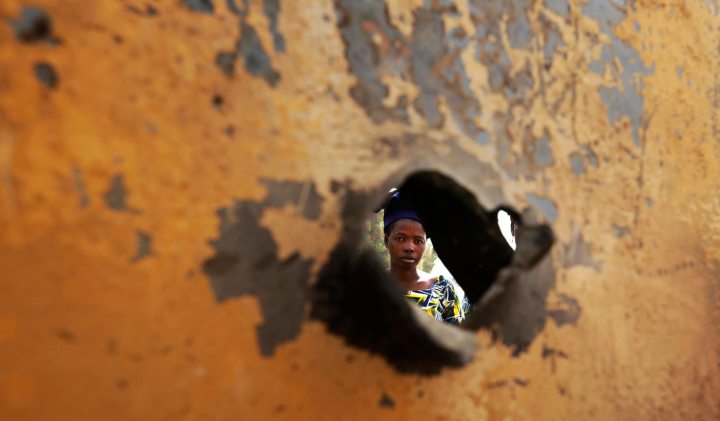Africa
The world according to Dirco (v. Jan 2013)

There has been no shortage of global drama in recent weeks, and for some, the Department of International Relations and Co-Operation’s monthly address to the media promised to illuminate South Africa’s take on international developments. For others, however, it turned out to be another mind-bending exercise in understanding South Africa’s foreign policy. By KHADIJA PATEL.
A Wall Street Journal reporter cut to the chase at the Department of International Relations and Co-Operation on Thursday when he asked Deputy Minister Ebrahim Ebrahim to reconcile the difference in South Africa’s stance on French intervention in Cote d’Ivoire and Mali. In his statement, the minister appeared to issue tacit approval of the French operation in Mali.
“South Africa will continue to support efforts by ECOWAS, the AU and the UN to restore peace and security in Mali,” he said.
Conversely, in 2011, the South African government sulked for months over French intervention in Cote d’Ivoire. And it was this particular intervention that was said to have inspired Dirco to nominate a South African to take over the reins of the African Union Commission.
The deputy minister, however, saw no incongruence between the South African positions on the French operations in Mali and Cote d’Ivoire. He said one key difference between Mali and Cote d’Ivoire was that French President Hollande telephoned President Jacob Zuma to ask his opinion and inform him about the French plans in Mali. “Sarkozy did not ring our president inform him [of his plans in Cote d’Ivoire],” Ebrahim said.
These are the minutiae that make up the global political spectacle. The New York Times’ Jodi Kantor last week wrote that a long-time adviser to US President Barack Obama was struck during the 2011 debt ceiling negotiations when Obama grew offended that House Speaker John A. Boehner did not return his phone calls. “The old Barack Obama would have thought the who-calls-whom protocol was stupid, the adviser said, but ‘the world that he inhabits now is the world of inside-the-Beltway manoeuvring’.”
Many understand the South African approval of the French operation in Mali as a direct consequence of the French assuaging a sense of self-importance among South Africans. We were consulted, therefore we approve.
Critics of South Africa’s foreign policy, particularly from the rest of Africa, believe this sense of self-importance in relation to the rest of the continent is entirely misplaced. To detractors, we’re positioning ourselves to further extend our hegemony over the rest of the continent.
Certainly, South Africa’s recent move to bolster its military presence in the Central African Republic, when a rebel insurgency threatened the government there, has been interpreted in some quarters as a move to assert dominance over a weak African state.
Ebrahim disagrees with such an assessment.
“There is no intention for us to try to boost our profile,” Ebrahim said. “South Africa has always said we will work with multilateral organisations.”
He explained that South Africa’s deployment of 200-odd troops to bolster the South African military presence in CAR stems from an agreement dating back to 2007. South Africa had agreed then to assist the CAR with military training. “We have assets there that need protection,” Ebrahim explained.
“The point is: government is very weak, the country is very poor.” He added, however, that the Central African Republic was richly endowed with mineral resources and South Africa sought to assist CAR to benefit from its mineral wealth.
And that might actually explain why South Africa rushed to bolster its military presence in the CAR. It is, after all, a matter of securing self-interest.
Ebrahim insists, though, that South Africa does not seek to lead the rest of the continent.
“I don’t think South Africa is positioning itself to take a leading position [in the continent],” Ebrahim said. “Like in Mali, we think it’s Ecowas who should be sending troops.”
Ebrahim said the troop pledges from Ecowas countries had so far exceeded the United Nations target of 3,000. South Africa would then not be required to contribute troops to Mali. Nonetheless, he indicated that South Africa would still be willing to assist the international intervention through other means.
Ebrahim also expressed concern at the worsening humanitarian situation in the entire Sahel region in West Africa.
“South Africa remains concerned about the deteriorating humanitarian situation throughout the Sahel region,” he said. “Over 15 million people, including 3.5 million Malians, across the Sahel have been affected by the food and nutrition crisis since 2012, and over one million children are at risk of severe malnutrition.”
“The recent insecurity in Mali has exacerbated this crisis. Internally displaced persons and refugees are continually arriving in drought-affected areas where food insecurity forecasts are among the worst in the region.”
Reports from aid groups estimate that about 9,000 people have been displaced by the conflict in Mali since France launched its military intervention earlier this month. A further 7,000 Malians are said to have streamed across borders to refugee camps in neighbouring countries in Niger, Burkina Faso and Mauritania.
And while South Africa continues to roll out an extensive aid package to the Sahel, the reality of the crisis there appears to be escalating faster than Malian and French troops win back territory in the north of Mali. At the heart of the conflict in Mali lies a dire humanitarian situation that has for years now been ripe for exploitation by armed groups. On this score, at least, the folks at Dirco are spot on. DM
Read more:
- Tuareg insurgency exacerbates food insecurity in Sahel region in Daily Maverick
- Sahel set to suffer the consequences of famine fatigue in Daily Maverick
Photo: A woman is seen through a bullet hole of a vehicle, believed to belong to Islamist rebels and destroyed during French air strikes, in the recently liberated town of Diabaly January 24, 2013. REUTERS/Eric Gaillard


















 Become an Insider
Become an Insider